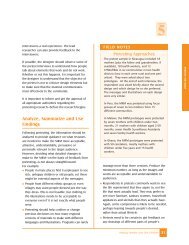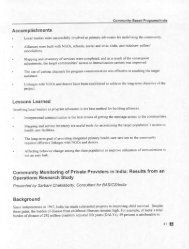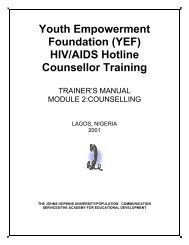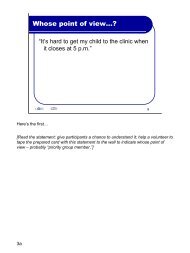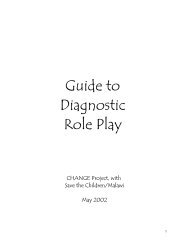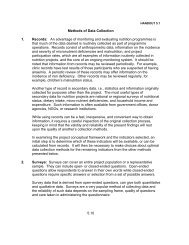MODULE TWO: COUNSELLING - FHI 360 Center for Global Health ...
MODULE TWO: COUNSELLING - FHI 360 Center for Global Health ...
MODULE TWO: COUNSELLING - FHI 360 Center for Global Health ...
Create successful ePaper yourself
Turn your PDF publications into a flip-book with our unique Google optimized e-Paper software.
“hoax clients”. In other words, most people who make the ef<strong>for</strong>t to visit a<br />
counsellor face-to-face are honestly seeking help.<br />
Encourage participants to give other examples of differences between telephone<br />
and face-to-face counselling.<br />
<strong>COUNSELLING</strong> SKILLS<br />
Following is a description of skills that are frequently used in counselling. This is<br />
just a list of the basic skills that are used most frequently and should be<br />
mastered by all YEF HIV/AIDS Hotline counsellors. There are, of course, many<br />
more advanced skills that are not covered here.<br />
Greeting Empathising Establishing Rapport<br />
Using Silence<br />
Questioning and Probing<br />
Active Listening Focusing Affirming<br />
Reflecting Speaking simply Summarising<br />
Supporting<br />
Correcting misperceptions Closing<br />
•Greeting<br />
Establishing contact with the caller in a way that is warm and welcoming.<br />
Greeting the caller with respect and in a way that conveys that you are ready<br />
and willing to listen in an unhurried manner and there<strong>for</strong>e establishing a good<br />
rapport with them.<br />
Ask participants <strong>for</strong> examples of greeting that could be used in the YEF HIV/AIDS<br />
Hotline. List them on the flipchart.<br />
_________________________________________________________________<br />
_________________________________________________________________<br />
_________________________________________________________________<br />
________________________________________________________________<br />
•Empathising<br />
Seeing the world through other’s eyes without judging them. Empathy is not the<br />
same as sympathy. Empathy means feeling with a person, while sympathy<br />
means feeling sorry <strong>for</strong> a person. 1 Sympathy creates a dead end in the<br />
conversation. Empathy involves understanding and acknowledging a person’s<br />
feelings in order to open up a conversation, encouraging dialogue.<br />
See “Focus on Feelings” vocabulary list at the end of this session.<br />
1 CONNECT (Zimbabwe Institute of Systemic Therapy). 1993. Basic Telephone Counselling Skills.<br />
Session 4 – Pg. 3



